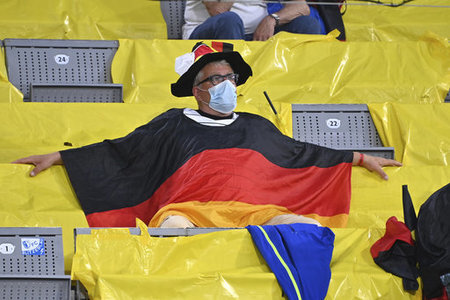[vc_row][vc_column][vc_column_text]

A protester with a pride flag confronts the Hungarian national team before their Euro 2020 match with Germany. Jvºrgen Fromme/DPA/PA Images
In celebration of one of football’s biggest international tournaments, here is Index’s guide to the free speech Euros. Who comes out on top as the nation with the worst record on free speech?
It’s simple, the worst is ranked first.
We round up the last of the groups today with Group F, which played the deciding matches on Wednesday.
1st Hungary
The recent Group F fixture between Germany and Hungary drew attention to Hungary’s poor record on free speech and censorship, when a protester carrying a pride flag ran on to the pitch. Hungary’s recent law, passed in June 2021, bans “the depiction or promotion of homosexuality to those under 18”. This includes teaching in schools and portrayals on television.
Prime Minister Victor Orbán was elected in 2010 and changed the constitution to take control of independent government institutions and initiated government policies to limit operations of opposition groups, journalists, and universities. According to non-profit Freedom House, the judiciary is unstable and controlled by the Prime Minister’s office, making it unusable in the struggle for free speech in Hungary. Reporters Without Borders (RSF) credit these policies for inspiring other European countries including Poland and Slovenia to institute similar restrictions on journalists.
Hungary’s coronavirus legislation gave the government almost unlimited power to handle the pandemic, a crisis which solidified Hungary as an information police-state where the prime minister can rule by decree without parliamentary oversight. Anti-scaremongering policies, meant to stop anyone “blocking the government’s anti-pandemic effort,” were used by Orbán to intimidate government critics and also temporarily suspended data protection policies. This fits with other incidents of government officials using their authority to suppress stories for their convenience.
Journalists who are caught conducting routine drone investigations in properties without express permission could get up to three years in prison under section 422 of the Hungarian criminal code, which focusses specifically on “illicit” data collection. Two journalists, Gabriella Horn and Balázs Gulyás, were threatened with this when investigating why military vehicles were present on land owned by businessman and friend of Orbán, Lőrinc Mészáros. It is a policy that shows the extent the government will go to, to side with government officials and oligarchs over journalists.
In May, journalist Júlia Halász appealed criminal charges of defamation and illegal recording for her publications after reporting on the harassment she endured while covering Hungarian diplomat, László Szabó.
Many journalists from the media company Magyar Hang reported government officials and their supporters harassing them for opposing Orbán’s reelection in 2018, and since the pandemic legislation, the head of the company, Csaba Lukács told the Committee to Protect Journalists, “reporting has become increasingly dangerous. This new legislation is a clear threat.”
In addition to government oppression, media publications face economic barriers in Hungary. Hungary’s government media council’s decisions have been criticised for being politicised because they prevented the consolidation of independent media companies while encouraging pro-government media outlets. Hungary’s largest independent newspaper closed in 2016, and the government oversaw the merger of hundreds of small media outlets in a major blow to Hungary’s media diversity.
2nd France
France may have placed at the top of the group on Wednesday, but their free speech record is mediocre. Generally, France has an independent judiciary, fair and free elections, and free and independent media that protect free speech rights in France.
In recent years, political turmoil has given France a bad record of violence against journalists. RSF described it as an overall “hostile environment for reporters.” Anti-immigrant and anti-Muslim demonstrations in France have been increasingly violent, and while covering them, journalists are often arbitrarily detained with their equipment seized or subjected to teargas grenades, flashbangs, and baton beating. At least two journalists in 2020 were called before French police and claimed to have experienced harassment under questioning. Policies implemented in 2010 make it possible for the government to claim “overriding public interest” to force journalists to break source confidentiality.
Journalists are targets of police violence during the recent large-scale protests over France’s “Global Security Law”, which makes it illegal to “maliciously share” images that may lead to the identification of a police officer. The police response to the Gilets Jaunes – or “Yellow Vests” – movement has been widely criticised for putting bystanders and journalists in harm’s way.
Journalists were the target of the worst terrorist attacks in France. Nine Journalists were killed in 2015 during the Charlie Hebdo shooting which was an attack on the satirical publication Charlie Hebdo. The gunmen identified themselves as members of the Islamist group, Al-Qaeda, and five years later, a second stabbing attack outside Charlie Hebdo is also suspect to have an Islamist terrorist motive.
In April of 2021, French Journalist Nadiya Lazzouni received a death threat with sexist and anti-Muslim slurs and proof that the sender had been watching her. She filed a complaint with the Paris prosecutor’s office but has not heard anything in response as of 15 April. For some journalists in France, both extremists and the police can be a threat to their safety.
3rd Germany
An active effort with constitutional safeguards to avoid repeating the country’s past has made Germany a stable democracy with well-protected civil liberties and political rights. Recent challenges with immigration have given a new rise to right-wing extremism and has created a more volatile environment for journalists. RSF’s 2021 report on Germany states “an independent judiciary ensures a favourable environment for journalists in Germany.” In recent years, the judiciary has been vital in preventing government policies that are harmful to journalists.
Despite the balanced government structure, Germany can still be a dangerous place for journalists. Extremists, mostly from the far right with some leftists, often use journalists as targets for violent attacks, and, especially during the Covid-19 pandemic, some politicians encouraged distrust in media outlets to promote populist agendas. In July of 2021, demonstrators protesting the Covid-19 lockdown physically blocked reporter’s cameras with their fists and shoved journalists while threatening them not to report on their protests. In May of 2021, Pro-Palestine demonstrators threw rocks and firecrackers at news crews in Berlin, and police used excessive force to prevent journalists from covering controversial evictions in October of 2020.
The Network Enforcement Act, a controversial law enacted in 2018, was brought in to regulate online hate speech and led to media companies deleting posts that would not have been considered hate speech. A majority of Germans, according to Freedom House, stated they are careful what they post online for fear of repercussions as a result.
Several government policies in response to extremism have been criticised for having unfair restrictions on journalism. In May of June 2021, their federal court ruled a law that was used to force journalists to reveal their sources was unconstitutional. Most recently in June 2021, a new law increased government surveillance and hacking power while removing judicial oversight and protections for Journalists during terrorism investigations, sparking concerns around protecting journalist sources from government retaliation.
4th Portugal
Portugal has a long history of restricting press freedom, but following the Portuguese Constitution guaranteeing freedom of expression in 1978, it has grown to be ranked ninth-best in RSF’s World Press Freedom Index of 2021. Despite a vocal minority that criticises the extent to which freedom of expression is allowed, Portugal now has a decent free speech record, but journalists are hindered by the economic downturn’s effect on their media industry. With a near-perfect score from Freedom House, Portugal earned a 96/100 for its effective political system and balanced judiciary Portuguese media outlets struggled with funding during the pandemic, and in response, Prime Minister António Costa advanced what the state planned to pay in government advertising to support the industry. Generally, public broadcasters have and struggle against commercial television outlets, which gives diverse viewpoints but some risk of populism.
Wrongful surveillance of journalists by police has been an issue. In January 2021, police were allegedly surveilling journalists illegally, without a court order, attempting to uncover their sources, and the Lisbon prosecutor’s office was exposed using electronic surveillance on two journalists in an attempt to reveal their sources in 2018. If charged for “breaching judicial secrets”, the two journalists could face up to two years in prison.
Another challenge Portugal has been facing is recent corruption scandals. In September of 2020, 17 people, including three judges, were charged with corruption. Portuguese authorities, complying with the international effort identified those involved and froze their assets, but some concerns remain around the poor resources provided to investigators and the ineffective anti-corruption and whistleblower protection legislation passed in 2019.
Other groups
Group E[/vc_column_text][/vc_column][/vc_row][vc_row][vc_column][three_column_post title=”You may also like to read” category_id=”8996″][/vc_column][/vc_row]





